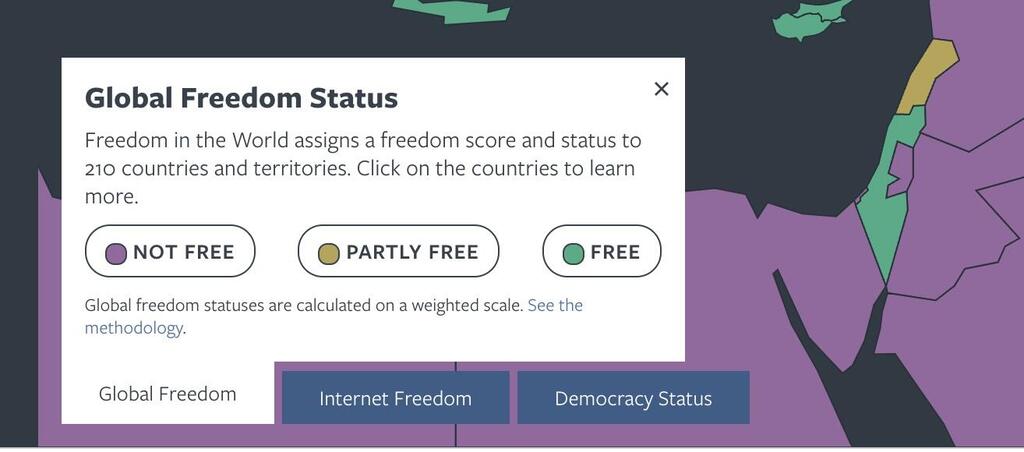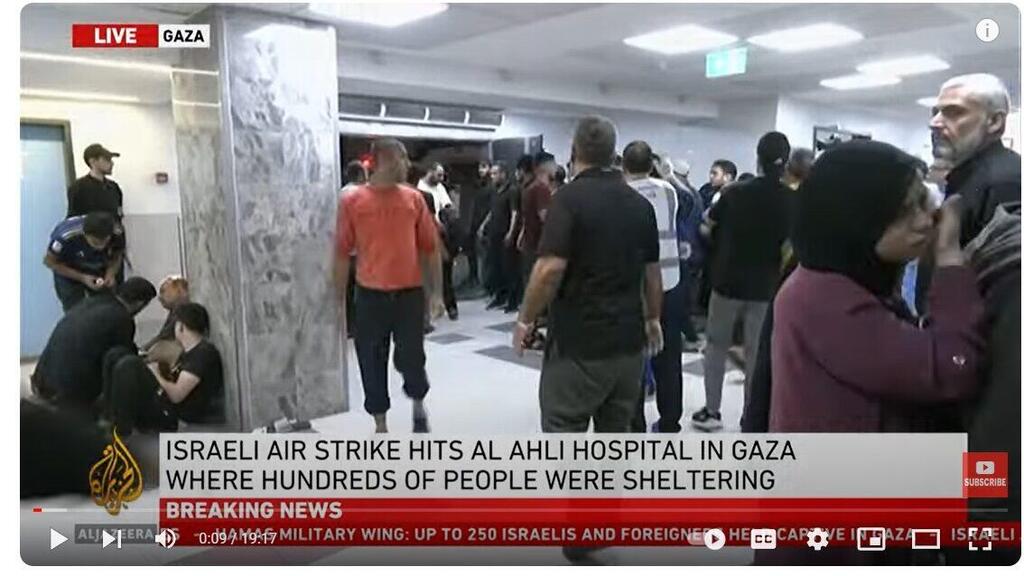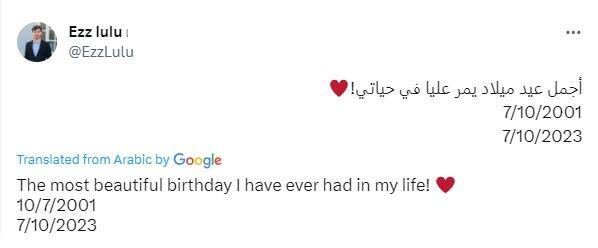There is an old aphorism that the first casualty of war is truth. The current Israel-Hamas war is bearing this out, with a cacophony of information, disinformation, misinformation, and outright lies spreading like wildfire as media outlets compete to publish first for clicks and revenue, and interested parties—governments, militaries, terrorist groups, special interest groups, talking heads, and millions of instant “experts” on social media—battle to win the narrative.
Read more:
An obvious consequence of this tangled mess has been a series of mistakes and failures to live up to journalistic standards, especially on the Gazan or pro-Palestinian side, according to analysts.
Among the most prominent examples is the case of the Al-Ahli Hospital in the Gaza Strip. Following an explosion at the hospital compound on the evening of Oct. 17, the Hamas-run health authorities in Gaza were quick to blame Israel, claiming that Israel had carried out an air strike on the hospital and had killed more than 500 civilians.
News outlets such as The Guardian, the BBC, The New York Times, and Al Jazeera quickly picked up and parroted the Hamas story, without questioning it.
BBC correspondent Jon Donnison told viewers on the evening of the explosion: “It’s hard to see what else this could be, really, given the size of the explosion, other than an Israeli air strike, or several air strikes,” and added, “When we’ve seen rockets being fired out of Gaza, we never see explosions of that scale.”
However, within hours of the explosion, the Israeli authorities released the results of their investigation, demonstrating that the explosion had been caused by a rocket fired by Islamic Jihad terrorists in the Gaza Strip that had misfired, as nearly one in every five of their rockets do. The Pentagon and other independent media outlets, including the BBC, later confirmed that this was the most likely scenario.
Additionally, by the next morning, it became clear that the hospital had not been hit at all. Rather, the rocket had landed in the parking lot, and the death toll was estimated to be closer to 100, if that.
But the damage was done. It was days before the media outlets published retractions if they did so at all. Even then, they often used wording suggesting that both sides were making equal claims on a matter that “could not be independently verified.” This was in stark contrast to the initial reports, which quoted the claims of Hamas Health Ministry spokesman Ashraf Al-Qudra and other Hamas figures word for word.
Few media outlets have been immune to this problem, which appears to expose an anti-Israel media bias, in practice if not in intent.
UK-based independent investigative journalist and media critic David Collier said that, alleged in-house biases aside, mainstream media struggle to find unbiased sources in the field and fail to make this clear to their readers and viewers, including when interviewing hospital staff.
“Where forced [by public pressure], media outlets have mentioned the Health Ministry or the official ministries [in Gaza] as being ‘Hamas-run’ or ‘Hamas-affiliated.’ But when it comes to individuals, there’s no mention at all of affiliation. They quote doctors as if they’re the local doctors at the NHS whom they fully trust, and they run with it. … There’s not even a hint of doubt,” Collier said.
In recent weeks, Collier has taken a particular interest in the Gaza-based doctors and journalists who are most often quoted in the media, tracking down who they are, where they work, what their credentials and affiliations are, and what they post to social media. Many raise alarm bells.
“The issue with journalists is that anyone can be one,” Collier said. “Everyone has cameras. It’s an easy way to make money [in Gaza]. They call themselves a journalist, throw on a ‘Press’ jacket, put it in their bio on Twitter or Facebook, and everything they say is swallowed up.”
But their content must be swallowed with a large pinch of salt, he said. As an example, he mentioned a recent report by Honest Reporting and Hind Khoudary, a Palestinian journalist and former Amnesty International researcher whom Collier helped to expose as explicitly biased.
Khoudary was often quoted and praised for her work in English. But in Arabic, she would often share content promoting “self-censorship in the interest of the Palestinian national movement and resistance,” even admitting in a video interview that she wants “Israel gone.”
As for medical personnel, two frequently quoted figures are the head of Shifa Hospital, Dr. Muhammad Abu Salmiya, and the head of the Health Ministry in Gaza, Dr. Munir Al Borsh. However, Collier said the minister “works for Hamas as a member of the government,” and the head of Shifa likely does too.
“His brother was killed in a targeted killing as a leader in Hamas’ military,” Collier said. “You don’t get to be the head of Gaza’s biggest hospital … if you’re not in bed with Hamas.”
Abu Salmiya and several others have now been arrested and are being questioned by the Israeli military following the discovery of tunnels and other evidence that the hospital was being used as a command center by Hamas and that several Israeli hostages were brought there.
As for other quoted “doctors,” some were in fact not doctors, but were medical students, nurses, or something else.
“And in some cases, I’m dubious they exist at all,” Collier said. “I’ve been doing this for a long time, and I know how to find people. But I couldn’t find anything on them. If he’s a doctor at Shifa, I should be able to find some reference to him somewhere. The fact that there’s no reference at all outside the newspaper [in which he was quoted] during a conflict … no history, nothing [raises questions].”
Collier said he found all of those quoted to hold explicitly pro-Hamas or anti-Israel leanings. A Washington Institute poll published in October found that over 50% of respondents in Gaza and the West Bank held favorable views of Hamas.
Asked if he himself was not an activist, Collier said, “Absolutely I am. I have three flags [UK, US, and Israel] in my profile and anyone knows whose side I’m on. But it doesn’t mean I’m a liar. I don’t have to shy away from the truth. If I did, then there’s something wrong with what I believe.”
Collier added, “I accept that Israel can be a sh-tty country at times, makes mistakes, does things wrong. … I’m not turning Israel into a holy state that can’t make mistakes. But it has a right to exist like any other, and I have no problem making that affiliation. In 2003, the US and UK went to Iraq and flattened it. Nobody turned around and said the UK had no right to exist.”
Asked whether Israel is more trustworthy than Gaza in its media content, Collier said there is no parallel between the two.
“Israel is a nation of law … and there are always red lines,” he said. “This is true anywhere in the world. But the US is not North Korea. … An example of this in Israel is Haaretz [a left-wing news outlet often critical of the Israeli government]. There is no Haaretz in Gaza. … There’s no comparison between journalists who are allowed to criticize the country, call to replace the prime minister, or focus on the fact that hostages’ families feel abandoned [with the reporting in Gaza].”
5 View gallery


Screenshot of the interactive Global Freedom map by Freedom House
(Photo: Screenshot )
Freedom House analyst Cathryn Grothe said that Israel has consistently scored high for press freedoms and transparency since reporting at Freedom House began. Freedom House is a nonpartisan, nongovernmental body that focuses on democracy and human rights. Grothe covers the Middle East and North Africa, and contributes to Freedom House’s two annual flagship reports, “Freedom on the Net” and “Freedom in the World,” which look at civil rights and liberties around the globe.
“Israeli media is quite vibrant and free to criticize government policy,” Grothe said. “Most things are permissible. There are some lines on military activity, or intelligence activities that aren’t as transparent, but that’s very common [globally]. In general, there’s a lot of press freedom and not just for press media but individual freedom to criticize openly. … The Israeli government has a decent track record on general transparency.”
That said, there has been a “chilling effect,” as Grothe calls it, since the right-wing Netanyahu government came to power late last year, which may have caused some to censor themselves in fear of reprisal.
And since the Hamas atrocities of Oct. 7, Grothe said that additional red lines had been drawn, with Arab Israelis being more cautious with what they put online.
“I don’t know the latest numbers, but there have been over 100 criminal investigations opened since October for individual statements in public and on social media with respect to the events of Oct. 7, the war in Gaza, and arrests for alleged incitement to terrorism. … We’ve definitely seen an uptick,” she said.
“While Israel’s Freedom of Information law does have protections for the rights of citizens to receive information from the government, there are pretty large exceptions for officials to withhold information on the military, armed forces, etc., which certainly will apply in the current war. Just a few weeks ago the Justice Ministry issued a memorandum allowing public authorities to delay responding to freedom of information requests, citing the war, so this could muddy the waters on the point of information transparency.”
The Palestinian territories, on the other hand, suffer from local suppression as well as Israeli, Grothe said. Terror-attack-related arrests aside, Grothe said that Israel regularly cracks down in the West Bank over allegations of incitement to violence. And both the Palestinian Authority and Israel have operated against dissenting voices and activists. Events surrounding evictions in the Jerusalem neighborhood of Sheikh Jarrah serve as a prominent example.
“We usually see trends and upticks in crackdowns around conflicts or violence [in East Jerusalem and the West Bank],” she said. “Whereas in Gaza, [dissenting voices] are targeted by Hamas.”
Israel unilaterally withdrew from the Gaza Strip in 2005, and Hamas fully controls the enclave.
Speaking of grading freedoms in the Palestinian territories, Grothe said, “The different indicators we use to look at these issues [include] media freedom and private discussion, that is, social media postings and personal comments on and offline. Each of these indicators goes up to four on the scale, four being the highest degree of press freedom. Gaza, mostly because of Hamas’ repression and restrictions on speech, gets a zero on both. In the West Bank, they get one out of four, indicating a slightly more open [environment].”
Asked about the level of support for Hamas, Grothe said, “For the last 17 years, the Hamas-controlled government has had no effective or independent way to ensure transparency across all things, whether its decision-making outside public view, or in its funding or operations. … So, it’s important to question and to have as many journalists doing as much independent fact-checking as they can. Hamas has not demonstrated the ability to be transparent or open with any information.”
Grothe also said that the Israel-led fuel shortages, internet blackouts, and general war chaos in Gaza only made speech harder.
Asked how much trust can be placed in reports coming from Gaza, including the numbers of dead and injured, Grothe said the “fog of war” means that no one will have precise numbers until after the conflict ends, although it is known that many civilians, including many children, have been killed or displaced.
“There are many facts from journalists on the ground that are undeniable,” she said. “And the Palestinian Health Ministry numbers are considered reliable in previous conflicts too.”
However, the Palestinian numbers do not distinguish between combatants and noncombatants, and ample evidence shows Hamas fighters regularly fighting in civilian clothing. In addition, Hamas videos show children undergoing military training with heavy weapons, including RPGs.
Asked how many of the dead, including women and children, might have been combatants Grothe said, “A lot is open to interpretation, what constitutes a ‘child’ vs someone who is not an adult. … Right now, it’s very hard to get any kind of very solid, accurate information. What we know is that people are being killed and mass displaced. Who those people are, I don’t think we’re going to have an accurate picture of that for a while.”





